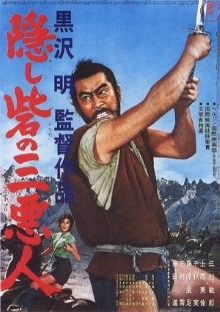
This marks the first film by Akira Kurosawa to be covered in this blog. Like most people I’ve watched Seven Samurai and was blown away by it but that was before I started writing about every film that I watch. Since then I’ve gained a new appreciation of this director’s skill thanks to the excellent Every Frame a Painting channel on YouTube and thought it was high time I slowly worked through some of this great director’s most successful works. This one was added to the list because it was apparently the direct inspiration for George Lucas when he made the original Star Wars.
At some unspecified point in time, the Yamana clan has attacked and successfully wiped most of the neighboring Akizuki clan. Tahei and Matashichi are two peasants from Hayakawa who wanted to join in on the fight, probably for money. Unfortunately they arrived late and were mistaken for being enemy soldiers by the victorious Yamana. After a series of misadventures, they escape and meet a brooding man who is really the general of the defeated Akizuki. General Rokurota Makabe’s mission is to smuggle the Akizuki Princess Yuki, the sole surviving member of the family, along with the Akizuki hoard of gold to the Hayakawa lands. Since the border between Akizuki and Hayakawa are heavily patrolled by Yamana soldiers, their plan is to sneak through the Yamana lands and enter Hayakawa through there. The general enlists the peasants to help him carry the gold both through threats of violence and by appealing to their greed while the princess has to pretend to be mute to hide her noble origins.
My wife characterized this film as being perfect and that certainly is true in the sense that the direction is flawless. Those who have watched only Seven Samurai may be disappointed that this isn’t a samurai epic in the same vein. Instead, The Hidden Fortress is a film in which the action adventure elements are balanced by plenty of humor and even a fascinating aperçu into the lives of peasants. It opens with a scene in which Tahei and Matashichi blame each other for their troubles, packing in an astonishing amount of storytelling in a short amount of time, and this density of content is kept up throughout the entire film. Moreover, every frame is exquisitely composed and shot. I’d said before that this film lacks the epic feeling of Seven Samurai and its extensive battles, but this doesn’t mean that it’s bereft of large scale scenes. The sight of seemingly hundreds of prisoners thundering through like a human wave as they riot is a great example of Kurosawa’s masterful ability to shoot movement.
The fight scenes and in particular the duel between general Rokurota and an enemy general, make for a very interesting comparison with modern action movies. From one perspective, they look pretty crappy. Without CGI, special effects or even camera tricks, they look exactly like what they really are: two men flailing at each other with wooden sticks. They look skilled, sure, but they’re not superhuman and they’re not above using obstacles in between them to gain an advantage. Yet from another perspective, the scene has a dramatic weight that most other action movies can’t match. You get the feeling that this is how a real fight in the real world would play out and you sense the tension in the movements of the two combatants as well as the audience who watches them. Most of the time, they do nothing at all except circle each other warily, gauging their respective strengths and searching for weaknesses. It makes for a wonderful contrast with modern fight choreography that has non-stop movement but little dramatic weight.
At the end of the day, The Hidden Fortress is still a commercial film made primarily for the entertainment of a mass market audience. It’s has no deep insight to offer and has no meaning to impart. I could spot no real similarities with Star Wars except that the audience is introduced to this world through the eyes of the lowly peasants, just as you are first shown the world of Star Wars through the eyes of C-3PO and R2-D2. Yet it is also the perfect demonstration of how far you can go with flawless film-making skills. It has thrills as general Rokuruta cuts down enemy soldiers, humor with the antics of the two peasants, fear as they are relentless hunted by a far superior force, tragedy as we realize the sacrifices that the Akizuki servants made for their beloved princess and even a kind of bittersweet joy in the Fire Festival celebrations of the Yamana peasantry. In short, so long as you’re willing to put up with an old black and white film, I’m confident that anyone who watches this will love The Hidden Fortress.
One thought on “The Hidden Fortress (1958)”